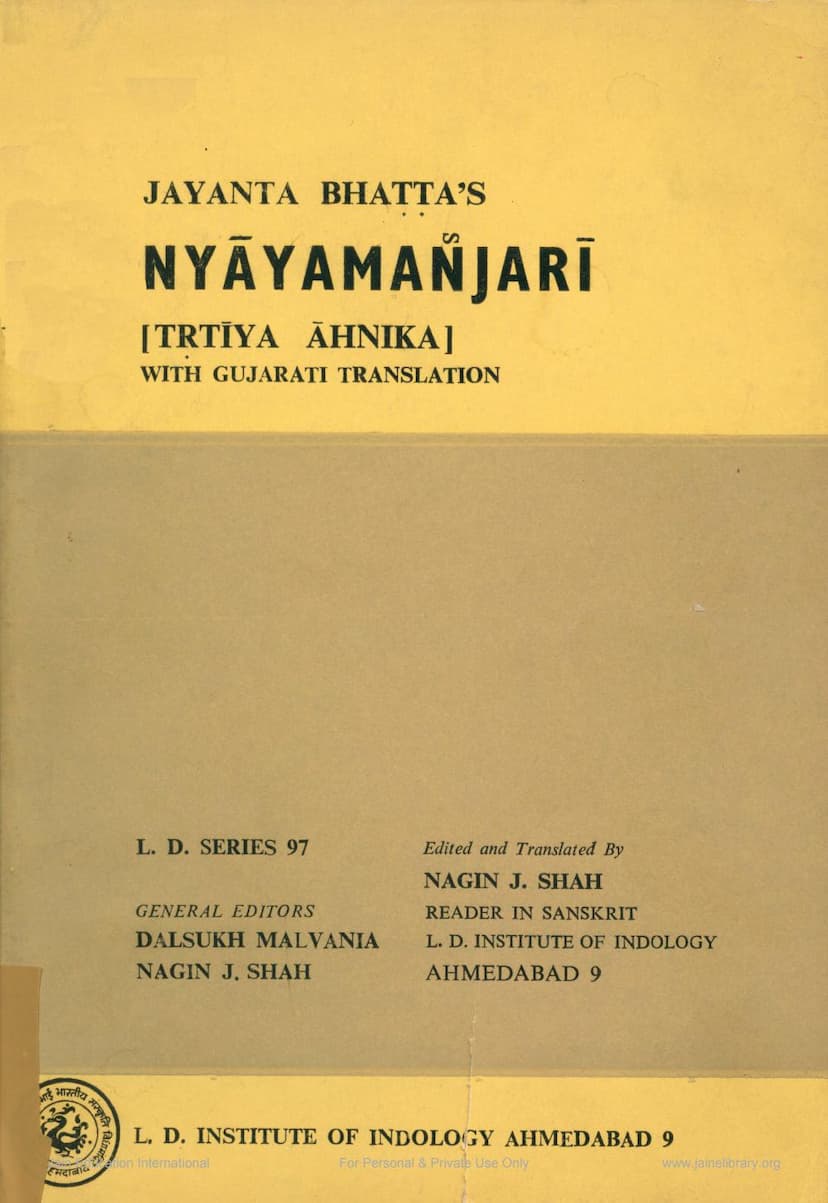Nyayamanjari Ahanika 03
Added to library: September 2, 2025

Summary
The provided text is the third Āhnika (section) of Jayanta Bhatta's Nyāyamañjarī, a significant work in Indian philosophy, particularly in the Nyāya (logic) tradition, with a focus on epistemology and metaphysics. This specific section, edited and translated by Nagin J. Shah, delves into several key areas of philosophical debate:
Overall Structure and Focus:
The Nyāyamañjarī is a commentary on Gautama's Nyāya Sūtras. While it functions as a vrtti (commentary), it often presents independent arguments and critiques of other schools of thought. The third Āhnika specifically addresses:
- Śabda Pramāṇa (Testimony as a Source of Knowledge): This is the central theme, discussing the nature, validity, and relationship of verbal testimony to other sources of knowledge.
- Khẏāti-vāda (Theories of Error): The text examines different explanations for erroneous cognition, a topic heavily influenced by the Mīmāṁsā school.
- Īśvara (The Concept of God): The existence and nature of a creator God are discussed, with arguments for and against the Nyāya and Mīmāṁsā positions.
- Śabda Nityatva (The Eternity of Sound/Words): The debate on whether words (sounds) are eternal or produced is explored.
Key Themes and Arguments:
The summary can be broken down by the major topics discussed:
1. Śabda Pramāṇa (Verbal Testimony):
- Definition and Analysis: The Āhnika begins by analyzing Gautama's definition of śabda pramāṇa as "āptopadeśaḥ" (the instruction of a reliable person). It dissects the terms "upadeśa" (instruction) and "āpta" (reliable person), considering various interpretations and counterarguments from different schools (e.g., Buddhists).
- Relationship with Other Pramāṇas: The text investigates whether śabda is distinct from anumāna (inference). It discusses arguments that verbal testimony is essentially a form of inference based on the reliable speaker's intention and knowledge. The Nyāya position, however, maintains śabda as a distinct pramāṇa.
- The Role of Vyakti and Sāmānya (Particular and Universal): The debate touches upon how meaning is conveyed – whether through particulars or universals, and how this relates to śabda. The discussion on gāvṛtva (cowness) as a universal is brought in.
- Validity (Pramāṇatva) of Śabda: A major part of the discussion revolves around whether the validity of śabda is inherent (svataḥ) or derived (parataḥ). The Mīmāṁsā view of inherent validity is contrasted with Nyāya's emphasis on external factors (like the reliability of the speaker and the absence of error). The debate extends to whether śabda itself is eternal or produced, and the role of convention (samaya) in establishing word-meaning relationships.
2. Khẏāti-vāda (Theories of Error):
- An'khyāti (Non-Apprehension): This theory, particularly from the Prābhākara Mīmāṁsā school, argues that error arises from a failure to apprehend the difference between perceived objects (like the shell) and remembered objects (like silver). The Nyāya school (represented by Jayanta Bhatta) critiques this extensively, arguing that this theory cannot adequately explain the positive presentation of the erroneous object (silver in the shell).
- Anyathākhyāti (Apprehension Otherwise): This is the Nyāya view, suggesting that error occurs when an object is apprehended in a different way or in a different context than it actually is.
- Viparyaya-khyāti (Apprehension of the Opposite): Similar to anyathākhyāti, but emphasizing the apprehension of the opposite.
- Atma-khyāti (Self-Apprehension): The Yogācāra Buddhist view that only consciousness is real, and the perceived world is a manifestation of consciousness.
- Asat-khyāti (Apprehension of the Non-existent): Associated with Mādhyamika Buddhists, arguing that erroneous perception refers to non-existent objects.
- Jayanta Bhatta generally defends anyathākhyāti and criticizes an'khyāti and asat-khyāti.
3. Īśvara (The Concept of God):
- Arguments for God's Existence: The text examines arguments for God's existence, primarily based on inference (anumāna) from the order and design in the universe (kāryatva, viśeṣa-sanniveśa). The Nyāya view acknowledges the possibility of a creator but often relies on āgama (scriptural testimony) for specific attributes.
- Critique of Arguments: Counterarguments are presented, questioning the validity of inferring God's existence from the perceived order, as such order might be seen as inherent or caused by something else. The problem of evil and suffering in the world is also raised as a challenge to the idea of a benevolent creator.
- Nature of God: If God exists, is He embodied or disembodied? Does creation occur through action or mere will? Does God's creation depend on karma? The text explores these questions.
4. Śabda Nityatva (Eternity of Sound/Words):
- The Debate: This section delves into the eternal nature of sound (śabda). The Mīmāṁsā school generally upholds the eternality of sound and its connection to meaning.
- Arguments for Production (Anityatva): Arguments are presented that words are produced, citing the need for effort, the impermanence of utterance, and the dependence on convention.
- Arguments for Eternity (Nityatva): Counterarguments are made, emphasizing the role of convention, the inability to prove the eternality of conventions, and the possibility of words being eternal entities apprehended through constant usage or mental impressions. The Pratyabhijñā (recollection/recognition) is presented as evidence for the eternality of words.
Methodology and Style:
- Dialectical Approach: The text employs a dialectical method, presenting a philosophical position, followed by objections from opposing schools (pūrva-pakṣa), and then refutations (uttara-pakṣa).
- Engagement with Other Schools: Jayanta Bhatta engages directly with the views of various philosophical schools, including Mīmāṁsā, Buddhism (especially Yogācāra and Mādhyamika), and Sāṅkhya.
- Linguistic Analysis: The discussion often involves a deep analysis of the meaning and usage of terms, highlighting subtle distinctions in philosophical concepts.
In essence, the third Āhnika of Nyāyamañjarī is a rigorous examination of the nature of verbal testimony, the causes of error, the concept of God, and the eternality of sound. It showcases Jayanta Bhatta's deep understanding of the philosophical landscape of his time and his skill in dialectical reasoning and argumentation.